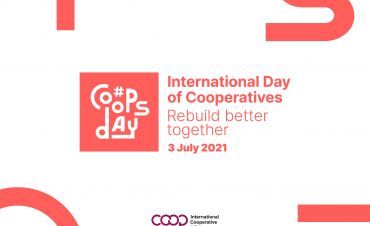
On 4 July cooperatives across the world will raise awareness of the importance of addressing climate change.
Greenhouse gas emissions are more than 50% higher than in 1990, and global warming is causing long-lasting changes to our climate system, with irreversible consequences should the world fail to act.
This is putting lives and livelihoods at risk, disrupting vital ecosystems for people and the planet, including co-ops in countries that are already suffering the effects of climate change.
Research shows some of the most disadvantaged groups affected by climate change include small-scale farmers, women, youth, indigenous peoples and ethnic minorities, who have to cope with extreme natural disasters and degradation of natural resources.
Cooperatives Taking Action
Cooperatives have long been champions of sustainability and this year’s International Day of Cooperatives will highlight their contributions to Sustainable Development Goal (SDG) 13 on Climate Action. ICA members adopted a resolution at the 2007 General Assembly calling on the cooperative movement to do its share in combating climate changes. Since then, cooperatives have continued their efforts. From agricultural cooperatives employing sustainable farming practices to consumer co-operatives supporting sustainable sourcing and energy co-ops leading the transitions to cleaner electricity, cooperatives are climate change pioneers. Similarly, worker and social co-operatives in various sectors provide goods and services in an efficient, eco-friendly way while creating long-term, sustainable jobs.
As explained in a policy brief by the Committee on the Promotion of Cooperatives (COPAC), cooperatives are increasingly involved both in climate change adaptation and mitigation.
In Côte d’Ivoire, which has lost a third of its forest cover to agriculture expansion, illegal and unsustainable logging, and uncontrolled forest fires, UIREVI, a cooperative union, is creating community forests. And in the Philippines, the Centre for Agriculture and Rural Development Mutual Benefit Association (CARD MBA) helped local communities recover in the aftermath of 2017’s typhoon Vinta by providing relief to over 50,000 members. A study from the University of Cambridge Institute for Sustainability Leadership indicates mutual microinsurance can strengthen resilience in vulnerable communities recovering from climate-related disasters.
In Brazil, Rede CataSampa, a network of 22 co-operatives and associations of workers who collect recyclables, including plastic, plays a key role in helping the public authorities reduce the volume of waste sent to landfills. Likewise, in the US, Coop Coffees, a green coffee-importing cooperative, is enabling coffee roasters (buyers) to pay a ‘voluntary carbon tax’ based on their carbon footprint in order to build a fund that directly invests in carbon-sequestering practices and other environmental-service projects of the producer partners.
A Journey to Action
Similar case studies will be showcased through an interactive map that will demonstrate the cooperative movement’s efforts against climate change. Developed in collaboration with DotCoop, the map also serves as an inspirational starting point for improving our environment and reducing the effects of global warming.
Participating cooperatives can show how they are taking action against climate change, be it through a recent campaign to plant trees in their community, developing a solar project or helping a community school create a recycling project.
Join us, share and be a part of the story
Co-operatives on social media can use the hashtags #CoopsDay and #Coops4ClimateAction. We invite members to participate in our photo competition - submissions will be accepted until 25 June. The photo that will best illustrate #Coops4ClimateAction will be featured on ica.coop and promoted via social media. We also invited members to submit personal 30 second videos to share their hope for 10 years from now, as a result of #Coops4ClimateAction. The most inspiring ones will be included in a special video that will be shared on July 4.
More information on how to get involved is available at https://www.ica.coop/en/2020-international-day-cooperatives.





